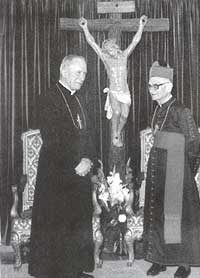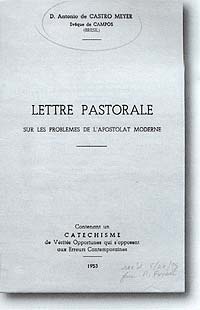Pastoral Letter: On the Problems of the Modern Apostolate
Bishop Antonio de Castro Mayer

Archbishop Marcel Lefebvre and Bishop Antonio de Castro Mayer.

Lettre Pastorale
For the first time in English, The Angelus is serializing On the Problems of the Modern Apostolate, the monumental pastoral letter of January 6, 1953, written by Bishop Antonio de Castro Mayer which identified modernist creep, crystallized the Church's teaching for his diocese (Campos, Brazil), and thereby saved clergy and faithful from the seduction of Vatican II.
Continuing what was begun in the December 2002 issue, we advance five more of Bishop de Castro Mayer's eighty True/False propositions which are classed into seven sections in the original letter: I. The Liturgy (1-13); II. The Structure of the Church (14-31); III. The Methods of the Apostolate (32-40); IV. The Spiritual Life (41-49); V. The New Morality (50-60); VI. Rationalism, Evolutionism, Laicism (61-65); VII. Relations Between Church and State (66-80).
Catechism of Opportune TRUTHS
Opposed to Contemporary ERRORS
|
27 TRUE By a disposition of divine Providence, the conversion of souls occurs by two means: on the one hand, by the exterior, visible activity of the hierarchy and the faithful, and on the other, by the invisible, interior action of grace, founded in large part upon the reparatory prayer and penance of contemplatives. In principle, the Church should always have an active life, a mixed life, and an essentially contemplative life. Suppression of one of these or any reduction that would practically equate to the suppression of one of them must not be desired. |
FALSE In the current conditions of urgent necessity of the apostolate, it would be better for the purely contemplative religious families to cease to exist or to greatly reduce the number of their members, for they take away from the active exterior apostolate persons who consecrate themselves entirely to prayer and penance. |
|
Explanation: The Holy Father Pius XII, faced with the current situation in the world, has granted dispensations to contemplatives to allow them to exercise an active apostolate. Nevertheless, it is not a question of suppressing religious families, nor of a reduction that would amount to the same thing. Moreover, in the same document, the Holy Father underlines that this activity absolutely must not dispense them from the contemplative life nor diminish its intensity. Here are his words: "And in first place, with regard to the contemplative life of religious nuns, that which, according to the mind of the Church, has always existed must be firmly and inviolably maintained, to wit, that all monasteries of religious nuns must canonically profess always and everywhere the contemplative life as their first and principal end. That is why the works and ministries, to which the religious nuns could and must be dedicated, must be of such a nature and so ordained, regarding place, time, mode and disposition, that the truly and solidly contemplative life, both of the entire community and of each nun, not only be safeguarded, but also constantly nourished and fortified."1 |
|
|
28 TRUE As the priest, by the sacrament of Order, is a sacred person, and occupies in the Church a specifically distinct situation above that of the common faithful, it is highly fitting to his situation for him to wear clothing completely different from what the simple faithful commonly put on. |
FALSE The so-called "clergyman" attire is better suited to our epoch and facilitates the work of proselytism better than the long robe imposed by Canon Law does. |
|
Explanation: The Church has always preferred the usage of the soutane. The so-called "clergyman" attire, on the contrary, originated in countries where the situation created by heresy and persecution made impossible for priests the normal life that they lead in Catholic countries. It is thus in conformity with the mind of the Church to praise and to conserve the wearing of the soutane. It is in basing itself upon this preference for the soutane that the collective pastoral letter of the Brazilian episcopate, drafted with a new approbation of all the Bishops in 1950, imposes its usage under severe penalties (no. 1262) and only tolerates other clothing in special circumstances (nos. 1260 and 1261). The Code requires proper clothing for priests in canon 136, but shows its preference for the soutane when it commands those who are going to celebrate holy Mass to be wearing it (canon 811). This preference for the soutane can be explained. The soutane, completely different from ordinary civil attire, better marks the separation that exists between the priest and the profane life. The suppression of the soutane has a very strong influence on the secularization of the clergy. |
|
|
29 TRUE To each state of life corresponds not only duties, but also appropriate ways of being and attitudes. Thus, the good priest will not only abstain from what is expressly condemned by the moral law, but also from all which, according to the consecrated expression, "non clericat." |
FALSE It is more in accord with the evolution and current necessities of holy Church that priests, in their social life, allow themselves all the diversions which are allowed to lay Catholics, as well as attitudes which are not forbidden to the latter. |
|
Explanation: The essential rules of morality cannot be reduced to what a man can or cannot do. The attitudes, diversions, manners permitted to a manual laborer are not suitable for a judge, and a head of family cannot allow himself the same attitude and fashions that a young bachelor can, even if the latter completely respects the prescriptions of the moral order. To abolish the manners, attitudes, and way of life which are suitable for the priesthood in order to allow the priests to lead a moral existence, yet on the same level as the laity, is to work for the secularization of society, and what is worse, for the secularization of the Church. On this subject, read canon 138 of the Code of Canon Law. |
|
|
30 TRUE From the fact that man has senses, it is necessary that what is exterior reveal the nature of institutions. That is why the more a charge is elevated, the more solemn must be the atmosphere surrounding it. The Bishop has the dignity of a prince in the Church of God, and the ecclesiastical principality is a more eminent dignity than the civil principality. That is why he has an obligation to surround himself with the splendor that befits his function. But, in his private life, he must excel in the practice of detachment from all things terrestrial. |
FALSE In the ambiance of majesty and aristocratic distinction that surrounds the hierarchy, there is an imitation of temporal princes. But the bishop is a pastor, not a prince. That is why what is suitable for him are not the trappings of the prince, but the simplicity and poverty of the pastor. |
| Explanation: The refuted phrase makes use of a play on words. It presents the pastor–the shepherd–as the image of the bishop. But it insinuates an identity between the two conditions, when there is between them just an analogy. The pastorate of men has a dignity evidently superior to that of the government of sheep. It would be contrary to the order of things for a prince or bishop to present himself, in everything and everywhere, as a shepherd of sheep. Indirectly, this would reduce men to the level of animals. It is well evident that the Episcopal splendor is in no way incompatible with meekness, humility, detachment and the fatherly conduct which must distinguish the bishop. It is thus that a veritable bishop, all the while upholding the dignity of his office, can and must be the father of each and all of the members of his diocese. | |
|
31 TRUE Our greatest duties of charity are towards those who live more united to God. Thus our zeal should turn in the first instance towards the preservation of the good. Thus the formation of fervent laymen is the indispensable condition of a real apostolate of conquest which we must all encourage. |
FALSE The only way to understand and to convert the working class is for the priest to leave the rectory and go towards the workers, mingle with them, adopt their manners and way of life in order to be able to exercise an influence upon them. |
| Explanation: The refuted sentence, except in rare cases, inverts the roles: the priest leaves the rectory and takes on the normal task of laymen. This is, moreover, a manifestation of the tendency to the laicization of the clergy. In order to grasp what is one-sided about such a suggestion, it is worth observing that it only aims at the conversion of the working class, as if paganism had not equally made ravages in the other social classes. Now, if we grant the principle that each class can only be evangelized by priests belonging to it, then we must logically have priest-farmers, priest-industrialists, priest-generals, priest-diplomats, etc., and the only thing lacking would be priest-priests. The saints have always dreaded, for themselves and for the clergy, this kind of laicized life. And the Church has always recommended to priests to abstain from it with great care. | |
1.Apostolic Constitution Sponsa Christi, Acta Apostolicae Sedis, 43, 11.
